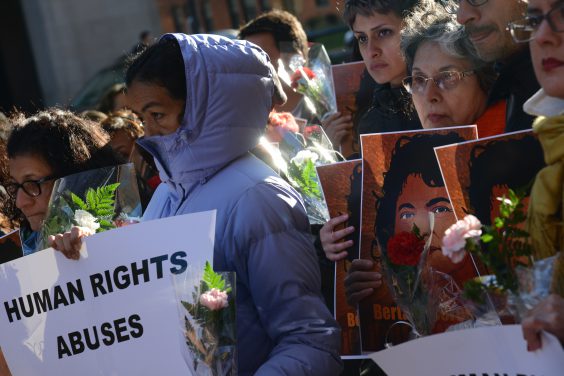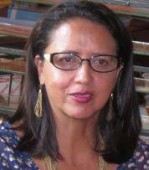The Blacklists for Eliminating Human Rights Defenders in Honduras are No Joke
by Dina Meza translated by Katherine Wingfield-Dobbs / September 15, 2016 / No comments

Protestors at a vigil for Berta Cáceres. Image by Daniel Cima via Flickr.
In the wake of the assassination of renowned environmental activist Berta Cáceres, human rights defenders and political opponents of the State continue to appear on military hit lists.
Last Friday, August 5, a source gave me a list containing the names of eight Honduran human rights defenders whom the government of Juan Orlando Hernández had ordered to be investigated and monitored.
In June of this year, an interview by the journalist Nina Lakhani, published in The Guardian, uncovered an extermination list managed by the Honduran military forces. The list, revealed by a military officer, described human rights defenders and political opponents in Honduras with their photos and names and an order to end their lives.

- Honduras has one of the world’s highest murder rates. It is also one of the most dangerous countries to practice journalism, ranking 129th out of 180 in the 2014 World Press Freedom Index. Journalists are regularly threatened, attacked, and killed for their work. The Honduran government fails to punish those who use violence against reporters, essentially granting them impunity. This space will be dedicated to examining the lack of protection for Honduran journalists exercising their profession. Topics will include the use of state-sponsored advertising as a mechanism to reward or punish publications, and censorship and self-censorship as hindrances to democratic progress.

- Born in Cofradía, Honduras, Dina Meza has been recognized by PEN International, Amnesty International, Index on Censorship and Reporters without Borders for her work as a journalist and human rights advocate. Currently, Dina is the driving force behind the creation of Honduras PEN Centre. In 2013, she wrote “Reign of Terror,” an in-depth report on threats to Honduran journalists for Index on Censorship’s magazine. In 2014, she was named one of Reporters Without Borders’ “100 Heroes and Heroines of Information.”
According to Lakhani’s report, the list was issued before the crime against Berta Cáceres at the hands of the Special Forces and the Inter-Agency Security Force (Fuerza de Seguridad Interinstitucional) – military personnel who were trained by FBI Agents and US Marines.
In the 2009 Coup, several lists were circulated containing the names of lawyers, journalists, human rights defenders, and political opposition members whose profiles Military Intelligence had drawn up with the intention of ending their lives. In an article published in 2013 in the newspaper conexihon.hn by the Committee for Free Expression (el Comité por la Libre Expresión), more than thirty names were published.
During the 1980s, the death lists were circulated on the walls of public buildings, where they placed the names of social leaders who were assassinated, disappeared, or against whom attempts were made. The public papers were signed by the death squads of the American Anticommunist Alliance (Alianza Anticomunista Americana) and by the Intelligence Battalion 3-16.
Although Honduras has undertaken to respect human rights in various international forums, internally, the message is not taken on board by the authorities, who only intend to deceive the international community.
The media’s handling of the Honduran authorities – from President Juan Orlando Hernández himself through other institutional levels – show that the State has complied with international human rights commitments, including the Universal Periodic Review. But it’s one thing to say something and another to actually do it. In this sphere, there is much repression against those who defend human rights and against the opposition.
What is certain is that the extermination list is no joke. The crime against Berta Cáceres made it clear that there is no truce from the powers who use the security forces to monitor, investigate, follow, and end the lives of those who dare to challenge a system of impunity.
When my source spoke to me about this new list that came from the house of Government with instructions for the Direction of Police Investigation (la Dirección de Investigación Policial) and the Strategic System for Collection, Collation, Analysis and Archiving of Information (el Sistema Estratégico de Recolección, Análisis y Archivo de Información) to proceed with carrying out the task because the eight people appearing there are considered “defenders who are hostile to the system,” I had no choice but to publish this denunciation in the newspaper pasosdeanimalgrande.com with the aim of disclosing a likely attack.
Intolerance leads to these shameful actions. Instead of rectifying the bad stuff and taking steps forward to end repression as a method of control, they act to the contrary – they abuse power and use State institutions to carry out such aims.
Jorge Jiménez, a human rights defender who has suffered repeated threats, explained that although he has done everything possible to remain calm in the face of increased threats, they have already reached his home by way of a note that warned that if he didn’t end his human rights work, they would kill him. He apparently had no choice but to distance himself a little.
The same authorities who are responsible for providing the security referred to in the precautionary measures issued by the Inter-American Commission on Human Rights are turning a blind eye to the constant attacks.
The monitoring is extreme. A human rights defender who arrived in the country on August 11 after spending a year in exile, which she embraced painfully, returned to Honduras where she is again being pursued ceaselessly. I know how they have harassed her since she set foot in the country – the constant calls seeking to intimidate her and the monitoring of her activities have not waited.
Unfortunately, we are up against a State that is almost void of life… its agony is constant. If we as a society do not rush to revive it definitively, we will regret it, as we will leave our children and grandchildren the shameful debris of a nation that deserves a different destiny. Acting today is key – if we wait any longer, it will be too late!




